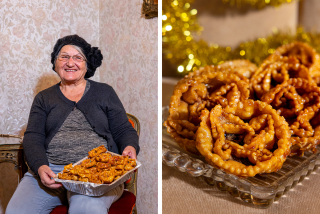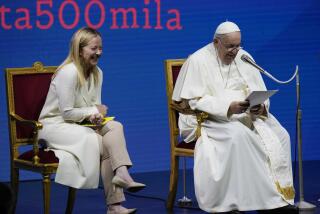In Italy, the Bambinos Outgrow Healthy Diet
- Share via
ROME — Big. That’s how many Italians sum up their impressions of the United States -- from the Grand Canyon to jumbo burgers to the backsides.
But Italians don’t have to cross an ocean to gape at flab.
This country of the good-for-your-waistline Mediterranean diet has produced a generation of chubby children. And with Italian youngsters now among Europe’s fattest, doctors worry about the nation’s health future.
“In the 20 years of my practice, the number of overweight and obese children has increased enormously,” said Andrea Vania, a pediatric nutritionist in Rome.
He’s appalled that he sees patients as young as 5 with weight problems. “We never used to see this.”
Curiously, southern European children in general are far chubbier than their counterparts in the north, where traditional diets are fatty ones.
Experts say blame for the extra pounds is twofold.
Not only have southern Europeans increasingly abandoned traditional diets rich in vegetables, fruits and grains for fatty ones, but indulgent parents are letting children lead some of the most sedentary lifestyles in Western Europe.
“You [Americans] colonized us. Italian children don’t follow the Mediterranean diet anymore,” said Margherita Caroli, an expert in pediatrics and diet, and a member of the European Child Obesity Task Force.
While calories are mounting, calorie-burning is not.
“Italian mamas coddle their children,” said Caroli, who is based in southern Italy.
A generation ago, Italian youngsters whiled away the hours kicking soccer balls. Now they’re being enrolled by their parents in computer courses or English lessons.
And although grandparents might have walked children to school a few decades back when cars were scarce in postwar Italy, students these days are driven to school or, if they’re old enough, zip there on their own motor scooters.
Surveys of European youngsters’ daily physical activity have found that Italian and Portuguese children are the least active, says Laura Rossi, a researcher at Italy’s national nutrition institute.
Italians are eating more meat and moving away from Mediterranean staples like pasta, rice and barley.
In the years right after World War II, many Italians went hungry and “meat was seen as a luxury that was good for you,” Rossi said.
The notion still sticks. The first question many Italian mothers ask their children after school is, “Did you eat your meat today?”
Children’s midmorning snacks used to be simple foods like focaccia, a kind of chewy bread. Jumbo bags of potato chips are the current playground status symbol.
Thirty-six percent of Italian children ages 6-11 are overweight, compared with 34% in Spain, 31% in Greece, 20% in England, 15% in Denmark and 13% in Finland, Caroli says. The U.S. Centers for Disease Control and Prevention says about 15% of American children and teenagers are overweight.
Experts disagree over what constitutes obesity in childhood.
For adults, the World Health Organization’s threshold for being overweight is a body mass index of 25, and those at 30 or more are considered obese. BMI is calculated by multiplying weight in pounds by 703, then dividing by height in inches squared.
Some experts contend that, in general, any child with a BMI above the 85th percentile for age and sex is obese, while others, like the CDC, use the 95th percentile.
What experts agree on is that overweight children tend to grow up to be overweight adults, with related problems like diabetes and heart ailments.
“A photograph of an obese child is the photograph of a future obese generation,” said Michele Carruba, a pharmacologist in Milan who heads the Italian Obesity Society.
But many parents resist the label of overweight for their children, says Vania, the nutritionist. “Children with a little bit of fat on them are considered cute and healthy.”
And Italy remains a country where the command “Eat!” is still often equated with maternal love.
Vania recommends activity and dietary changes for his young patients, among them Azzurra Cariola, who was 10 years old and 125 pounds when she asked to see a doctor.
“The kids made fun of me. They called me ‘fatso,’ ” said Azzurra, now 14, in high school and no longer overweight.
Her mother, Anna Maria D’Angelo, says Azzurra used to wolf down cookies when at friends’ homes, and D’Angelo had quit preparing traditional vegetable dishes for her family because she was the only one who would eat them.
She puts much of the blame for the weight problem of her daughter’s generation on Italy’s higher standard of living.
When D’Angelo visited her husband’s small town in Sicily 30 years ago, “there were no supermarkets, and all the people were skinny,” she said. “They ate pasta and beans, the real Mediterranean diet.” Now “they have supermarkets and lots of fat people.”
More to Read
Sign up for Essential California
The most important California stories and recommendations in your inbox every morning.
You may occasionally receive promotional content from the Los Angeles Times.











